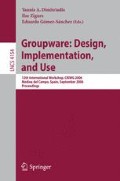Abstract
Functional and non-functional requirements must be taken into account early in the development process of groupware applications in order to make appropriate design decisions, e.g. spatial distribution of group members and group awareness, which are related to the main characteristics exhibited by CSCW systems (communication, coordination and collaboration). This research work presents a proposal intended to facilitate the development of groupware applications considering non-functional requirements such as reusability, scalability, etc. In order to achieve these objectives, the proposal focuses on the architectural design and its implementation, with emphasis on the use of a realization of the technological Linda coordination model as the basis for this implementation. The outcome is a distributed architecture where application components are replicated and event control is separated. This work is part of a conceptual and methodological framework (AMENITIES) specially devised to study and develop these systems.
Access this chapter
Tax calculation will be finalised at checkout
Purchases are for personal use only
Preview
Unable to display preview. Download preview PDF.
References
Álvarez, J., Bañares, J.A., Muro-Medrano, P.R.: An Architectural Pattern to Extend the Interaction Model between Web-Services: The Location-Based Service Context. In: Orlowska, M.E., Weerawarana, S., Papazoglou, M.P., Yang, J. (eds.) ICSOC 2003. LNCS, vol. 2910, pp. 271–286. Springer, Heidelberg (2003)
Architecture Working Group: Recommended Practice for Architectural Description of Software-Intensive Systems. IEEE Std 1471 (2000)
Beaudouin-Lafon, M.: Computer Supported Cooperative Work, Université Paris-Sud, France. John Wiley & Sons, Chichester (1999)
Cabri, G., Leonardi, L., Zambonelli, F.: XML Dataspaces for Mobile Agent Coordination. In: 15th ACM Symposium on Applied Computing, pp. 181–188 (2000)
Carriero, N., Gelernter, D.: Linda in Context. Communications of the ACM 32(4), 444–458 (1989)
Chung, G., Dewan, P.: Towards Dynamic Collaboration Architectures. In: Proc. ACM CSCW 2004, pp. 1–10 (2004)
Ellis, C.A., Gibbs, S.J., Rein, G.L.: Groupware: Some Issues and Experiences. Communications of the ACM 34(1), 38–58 (1991)
Garrido, J.L., Gea, M.: Modelling Dynamic Group Behaviors. In: Johnson, C. (ed.) DSV-IS 2001. LNCS, vol. 2220, pp. 128–143. Springer, Heidelberg (2001)
Garrido, J.L., Gea, M.: A Coloured Petri Net Formalisation for a UML-Based Notation Applied to Cooperative System Modelling. In: Forbrig, P., Limbourg, Q., Urban, B., Vanderdonckt, J. (eds.) DSV-IS 2002. LNCS, vol. 2545, pp. 16–28. Springer, Heidelberg (2002)
Garrido, J.L., Gea, M., Rodríguez, M.L.: Requirements Engineering in Cooperative Systems. Requirements Engineering for Sociotechnical Systems. IDEA GROUP, Inc., USA (2005)
Garrido, J.L., Padereswki, P., Rodríguez, M.L., Hornos, M.J., Noguera, M.: A Software Architecture Intended to Design High Quality Groupware Applications. In: Proc. of the 4th International Workshop on System/Software Architectures (IWSSA 2005), Las Vegas, USA (June 2005)
Gelernter, D., Carriero, N.: Coordination Languages and Their Significance. Communications of the ACM 35(5), 96–107 (1992)
Grudin, J.: Groupware and Cooperative Work: Problems and Prospects. In: Baecker, R.M. (ed.) Readings in Groupware and Computer Supported Cooperative Work, pp. 97–105. Morgan Kaufmann, San Francisco (1993)
Gutwin, C., Penner, R., Schneider, K.: Group Awareness in Distributed Software Development. In: Proc. ACM CSCW 2004, pp. 72–81 (2004)
Jacobson, I., Booch, G., Rumbaugh, J.: The Unified Software Development Process. Addison-Wesley, Reading (1999)
Johanson, B., Fox, A.: The Event Heap: A Coordination Infrastructure for Interactive Workspaces. In: Proc. of the 4th IEEE Workshop on Mobile Computer Systems and Applications (WMCSA-2002) Callicoon, New York, USA (June 2002)
Macaulay, L.A.: Requirements Engineering. Springer, Heidelberg (1996)
Mehra, A., Grundy, J., Hosking, J.: Supporting Collaborative Software Design with a Plug-in, Web Services-based Architecture. In: Proc. of the ICSE 2004 Workshop on Directions in Software Engineering Environments, Edingurgh, Scotland. IEE Press (May 2004)
Object Management Group: Unified Modelling Language (UML) 2.0 Superstructure Specification (OMG), Ptc/03-08-02, pp. 455–510 (August 2003)
Papadopoulos, G.A., Arbab, F.: Coordination models and languages. In: Advances in Computers, vol. 46. Academic Press, London (1998)
Paternò, F.: Model-based Design and Evaluation of Interactive Applications. Springer, Heidelberg (2000)
Patterson, J., Day, M., Kucan, J.: Notification Servers for Synchronous Groupware. In: Proc. of the ACM Conference on Computer-Supported Cooperative Work (CSCW 1996), pp. 122–129 (1996)
Phillips, W.G.: Architectures for Synchronous Groupware. Technical Report 1999-425, Department of Computing and Information Science, Queen’s University (May 1999)
Roseman, M., Greenberg, S.: Building Real Time Groupware with GroupKit, A Groupware Toolkit. ACM Transactions on Computer Human Interaction 3(1) (March 1996)
Schlichter, J., Koch, M., Burger, M.: Workspace Awareness for Distributed Teams. In: Conen, W. (ed.) ASIAN-WS 1996. LNCS, vol. 1364. Springer, Heidelberg (1998)
Shen, H., Sun, C.: Flexible Notification for Collaborative Systems. In: Proc. of ACM 2002 Conference on Computer Supported Cooperative Work (CSCW 2002), New Orleans, USA, pp. 16–20 (2002)
Sommerville, I.: Software Engineering, 7th edn. Addison-Wesley, Reading (2004)
Sun Microsystems: Jini Distributed Events Specification. Version 1.0., available on-line at: http://java.sun.com/products/jini/2.1/doc/specs/html/event-spec.html
Sun Microsystems: JavaSpaces Service Specification. Version 2.2., available on-line at: http://java.sun.com/products/jini/2.1/doc/specs/html/js-spec.html
Tolksdorf, R., Glaubitz, D.: XMLSpaces for Coordination in Web-based Systems. Tenth IEEE International Workshops on Enabling Technologies: Infrastructure for Collaborative Enterprises 06, 20–26 (2001)
van der Veer, G., Lenting, B., Bergevoet, B.: GTA: Groupware Task Analysis - Modelling Complexity. Acta Psycologica 91, 297–322 (1996)
Wyckoff, P., McLaughry, S., Lehman, T., Ford, D.: TSpaces. IBM Systems Journal 37(3), 454–474 (1998)
Author information
Authors and Affiliations
Editor information
Editors and Affiliations
Rights and permissions
Copyright information
© 2006 Springer-Verlag Berlin Heidelberg
About this paper
Cite this paper
Garrido, J.L., Noguera, M., González, M., Gea, M., Hurtado, M.V. (2006). Leveraging the Linda Coordination Model for a Groupware Architecture Implementation. In: Dimitriadis, Y.A., Zigurs, I., Gómez-Sánchez, E. (eds) Groupware: Design, Implementation, and Use. CRIWG 2006. Lecture Notes in Computer Science, vol 4154. Springer, Berlin, Heidelberg. https://doi.org/10.1007/11853862_23
Download citation
DOI: https://doi.org/10.1007/11853862_23
Publisher Name: Springer, Berlin, Heidelberg
Print ISBN: 978-3-540-39591-1
Online ISBN: 978-3-540-39595-9
eBook Packages: Computer ScienceComputer Science (R0)

